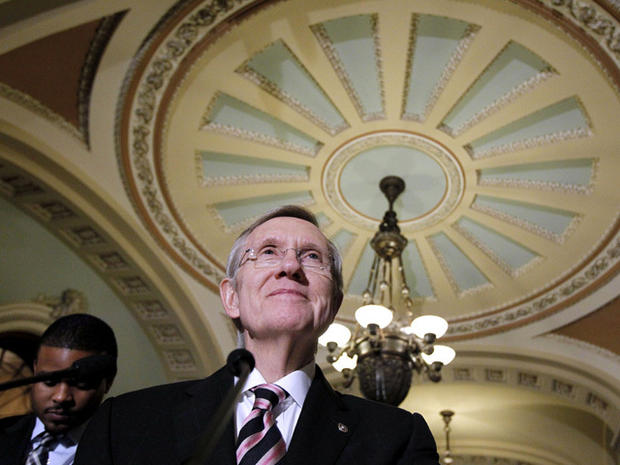Democrats offer scaled-down payroll tax cut plan
Senate Democrats unveiled their latest plan on Monday to extend the Social Security payroll tax cut holiday, which is set to expire on January 1, if no congressional action is taken.
The legislation would reduce the payroll tax to 3.1 percent for next year from the current 4.2 percent. If no action is taken by the end of the year the payroll tax would revert to 6.2 percent.
"This proposal will allow the average family to keep an extra $1,500 to spend on necessities next year," Senate Democratic Leader Harry Reid said as he was introducing the proposal on the Senate floor. "It will be fully paid for with a mixture of spending cuts republicans have already agreed to and a tiny, tiny surtax on the top .2% of American taxpayers."
The new proposal, which the Democrats characterized as a compromise, is modified by paring down the surtax on the wealthiest Americans from 3.25 percent to 1.9 percent.
The surtax is temporary and would expire after 10 years, an attempt by the Democrats to address concerns of Republicans over the creation of a permanent tax increase for a temporary payroll tax cut.
"It s hard for the majority to call this a compromise when the other side hasn't been involved," said Senator Orrin Hatch, R-Utah, the senior Republican on the Senate Finance Committee. "Frankly, the only thing bipartisan about this latest political gambit is opposition to the permanent tax hike on small businesses to pay for temporary one-year tax policy."
The revised plan sponsored by Senator Bob Casey, D-Pa., eliminates a provision in an earlier proposal that would reduce payroll tax for employers and businesses.
The new, scaled-back version of the bill carries a price tag of $185 billion over ten years, down from $265 billion for the plan which was rejected in the Senate last week. Democrats hope the reduction in cost will result in more Republican support.
The proposal also raises $38 billion by increasing fees that Fannie Mae and Freddie Mac, the government controlled mortgage companies, charge mortgage lenders.
The latest Democratic bill includes language proposed by Senate Republican Leader McConnell last week that would prevent millionaires from collecting unemployment benefits and food stamps.
"This is a serious proposal and Republicans should take it seriously," Reid said. "Republicans in Congress dismiss it at their peril. The
American people are watching."
Republicans remain wary of any proposal that combines extending and expanding the payroll tax cut with a surtax on millionaires.
Senator Jon Kyl, R-Ariz., the number two Republican in the Senate, said on the chamber floor: "The surtax that would fund this is something that would very much hurt small business and job creation."
A House GOP Leadership aide called the inclusion of the millionaires surtax a poison pill. This proposal moves in the right direction, but the inclusion of the small business tax hike is a poison pill that shows Senate Democrats are aiming to fail so President Obama can attack Republicans, the aide said.
The legislation faces at test vote later this week and is not expected to get the 60 votes necessary to advance in the Senate.
Democrats and Republicans on both sides of the Capitol struggle to reach agreement on a tax cut proposal both sides can support and pass before Congress adjourns for the year.
